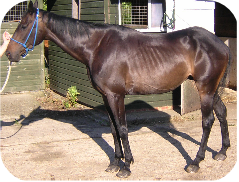Condition
You have probably reached this page because your horse has been losing weight, become skinny and thin and is lacking condition.
You may alternatively have been looking for advice on Equine Obesity .

Horses drop weight, lose condition and become thin and poor because of an inadequate supply of essential nutrients! The fat cover is used up first to meet your horse’s daily energy requirement. When that is exhausted muscle and other high-protein tissue gets broken down, leading in extremis to the poor example on the right.
Horseheath Nutrition products have been used very successfully for many years to promote weight gain and restore lost condition to thin horses, and then maintain it, as you can see from the various testimonials on the Gravenhorse website
Causes of Equine Weight Loss
- Human error – Underfeeding! If in doubt seek advice – you should invest in weighing equipment – many feed merchants and tack shops stock spring balances for weighing hay nets and kitchen scales can be used for feed scoops.
- Insufficient/Poor quality protein: Muscle consists of protein. Proteins consist of amino acids. All animals require a daily supply of suitable quality protein (must contain enough essential amino acids, e.g. lysine, methionine, etc) to maintain muscle and other protein. Hard working or growing animals have a much greater need for good quality protein.
- Illness suppressing appetite or impairing digestion: e.g. gut tumours, colic, scour, gastric and colonic ulcers, etc. Consult your vet.
- Stress: e.g. bullying, travelling. Stallions are notoriously prone to weight loss during the covering season.
- Worn or damaged teeth preventing a horse chewing its food properly, impairing food digestion.
- Inadequate worming – serious damage can be caused to the gut, liver and blood vessels, which will cause condition and weight loss (as above) and ultimately death. Do not omit tapeworm from your worming programme!
- Other parasites e.g. lice, mange, etc can in extremis have a debilitating effect.
- Age – A horse’s digestive system will become less efficient over time. A number of veterans, including some toothless geriatrics (equine) have had their lives extended considerably with Horseheath products.
Restoring Condition
- Address the management problems listed above.
- Check the diet – if necessary complete the nutrition section of the website’s contact form so that John Chapman can evaluate it. Ensure good quality forage is available ad-lib.
- Increase the protein and energy content of your horse’s feed by adding full fat soya and/or micronised (cooked) linseed to the diet. Other quality sources include copra, milk powder, cooked peas and cooked beans.
- If the condition loss is only moderate, feeding the following Horseheath products may suffice: Body-Builda™, Acceler>8™ (formerly Equi-Builda™), LinGold™. See Products page.
A horse requires a minimum of 1.5% of its bodyweight per day of dry fibre to keep its gut working properly. A 500 kg horse will therefore need 7.5 kg (16.5lb) of hay (12% moisture content) or 19 kg of haylage (30% moisture). In practice it will need rather more (to satisfy its chewing urge) and can eat up to around 3% of its bodyweight in fibre. A typical small hay bale weighs around 20kg/44lb; a stabled horse will normally require nearly 1/2 bale/day. If in doubt weigh your haynet! Especially if you are feeding hay or haylage from large bales.
Significant weight loss will involve muscle wastage; weight gain requires top quality protein, which you will find in these Horseheath products: Full-fat soya (either meal or flakes) and Full-fat cooked linseed meal (ready to use); Copra meal; Horseheath BodyBuilda . The latter contains substantial starch so will not be suitable for horses requiring a minimal soluble carbohyrate diet e.g if suffering Cushings Disease, Equine Metabolic Syndrome (EMS) or prone to lamitis, Polysaccharide Storage Myopathy (PSSM) “Tie-ing up” Equine Shivers; etc etc
EXCESS Weight
For all species an excess of energy intake over usage will result in weight gain & can in extremis lead to problems such as EQUINE METABOLIC SYNDROME. Reversing it is obviously the opposite! However horses need a daily minimum of at least 1.5% of their normal bodyweight in dry fibre to maintain gut health & will typically eat 2 to 3% given the opportunity. On adlib grazing or forage the energy intake can exceed that required for maintence and result in fat horses.
Slimming your horse: this MUST BE DONE GRADUALLY otherwise gut problems will arise.
I. restrict grazing by turning out in a starvation paddock. Provide some clean straw (preferably oat) to enable a hungry horse or pony to satify its appetite.
2. fit a grazing muzzle if on good pasture.
3 Restrict turnout time & preferably graze at night when grass sugar content is lowest.
4. Provide some clean (oat) straw in the stable.
5. Soak hay to remove excess sugars. This will remove required minerals & vitamins so you should feed a supplement or low-energy balancer to replace them. The latter is more expensive than a pure mineral & vitamin supplement Add to a low/sugar-free chaff with a little low-sugar soaked beet pulp for palatability.
6. Hay intake can be slowed down by use of small mesh or double nets. Floor level feeders are also available.
7. Increase exercise to use up surplus energy.
